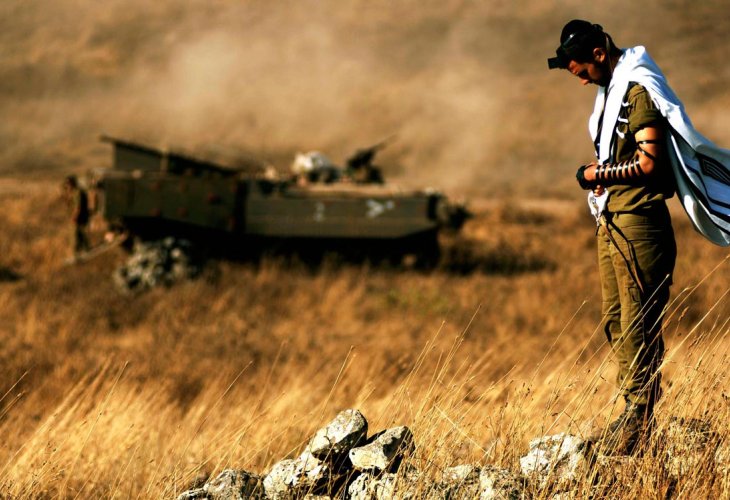Personal Stories
Surviving by a Miracle: The Power of Tefillin in War
A reserve soldier shares how putting on tefillin saved his life during the Lebanon War
- Shifi Charitan
- |Updated

"Every morning when I put on my tefillin, the memory returns. I’m alive because of a miracle. If I hadn’t put on tefillin that day, I wouldn’t be here." Tzvi Azaria from Rehovot repeats this again and again. Speaking with Hidabroot, he shares his incredible story from the 1982 Lebanon War.
Tzvi, then a sergeant first class in the reserves, had been a cadet studying for an engineering degree in electronics and electro-optics in Jerusalem, at Kiryat Noar.
“When the First Lebanon War broke out,” he recalls, “most of us cadets were called up. After a serious briefing, I was assigned to an operational battalion that carried out special, covert missions. Near the end of the war, we received intelligence about Syrian commando units hiding in the cemetery between Sidon and a nearby town called Aktanit.”
These Syrian commandos had already destroyed several IDF tanks and heavy vehicles using highly sophisticated tactics. They were difficult to locate and even harder to eliminate.
“At sunset, we reached the cemetery. Our unit was split between two APCs (Armored Personnel Carriers), and we stopped about ten meters from the edge of the cemetery to look for a place to spend the night.
While we were searching, I noticed several ‘fresh’ graves in the dirt path separating us from the cemetery. We sat down to observe the area. I was thinking about our exhausting day when I suddenly realized I hadn’t put on tefillin yet.”
Tefillin are small black leather boxes containing verses from the Torah, traditionally worn by Jewish men each weekday morning during prayer. The image of his mother, who had lovingly sewn the tefillin bag and attached it to his personal gear, came to mind. He felt a strong need to fulfill this mitzvah even in the middle of war.
“I tried to convince myself it wasn’t a big deal. After all, I was a soldier in combat. But I couldn’t find peace. I had to put on my tefillin. My commander wouldn’t let me leave the APC, and I found myself arguing with him. I begged, ‘Just a few minutes,’ and stepped outside.”
At the far edge of the cemetery, a few meters away, he noticed a water fountain. He went to wash his hands. The APCs had to move ahead, so they agreed to wait about 50 meters from where he stood.
“I stood in one corner. The APCs were at a distance. Between us were the fresh graves I had seen earlier.”
Tzvi removed the tefillin and his tzitzit, a garment with fringes worn under a shirt and began reciting the Shema prayer with deep concentration.
Before he could finish, he noticed something strange: a cloud of dust rising from the fresh graves.
“Seven Syrian commandos suddenly emerged, wearing black gas masks with long tubes and holding RPGs, deadly anti-tank weapons. I later learned this was their method: they would dig into graves and lie there for hours. When they felt vibrations in the ground, they knew vehicles were approaching. Then they would pop up and destroy them.”
Tzvi was alone. He had only his long M16 rifle, which soldiers called a “broom.” He set it to single-shot mode, but hesitated, his fellow soldiers were directly behind the enemy in the line of fire.
“I dropped to one knee and aimed at their heads. I knew they were seconds away from firing at the APCs. I fired the first 20 bullets like a madman. I didn’t even understand how much danger I was in. I couldn’t count how many went down, but I saw two of them turn toward me.
They were trying to figure out who was shooting. And then they saw me: an IDF soldier, wearing a black tefillin cube on my head, leather straps wrapped around my arm, and a white garment with black stripes, my tallit katan (a small fringed garment worn under the shirt)."
“I had ten bullets left. It was clear, either I fired, or I would be killed. I released a final burst, and then, from the direction of the cemetery, my team opened fire too.”
Today, Tzvi works as a civilian employee with the IDF, but he has never left the battlefield in spirit. His voice trembles with emotion as he reflects on that moment.
“There’s no natural explanation for the miracle that happened there,” he says.
And now, especially during these days known as Bein HaMetzarim, the “Three Weeks” leading up to Tisha B’Av, he shares a heartfelt message.
“People often quote the verse, ‘All her pursuers overtook her between the straits,’ and they understand it in a negative way. But I sayת anyone who pursues mitzvot and good deeds during these days, even if they haven’t managed to succeed all year, will succeed. And with Hashem’s help, everything will turn out for the best. May we all hear only good news.”

